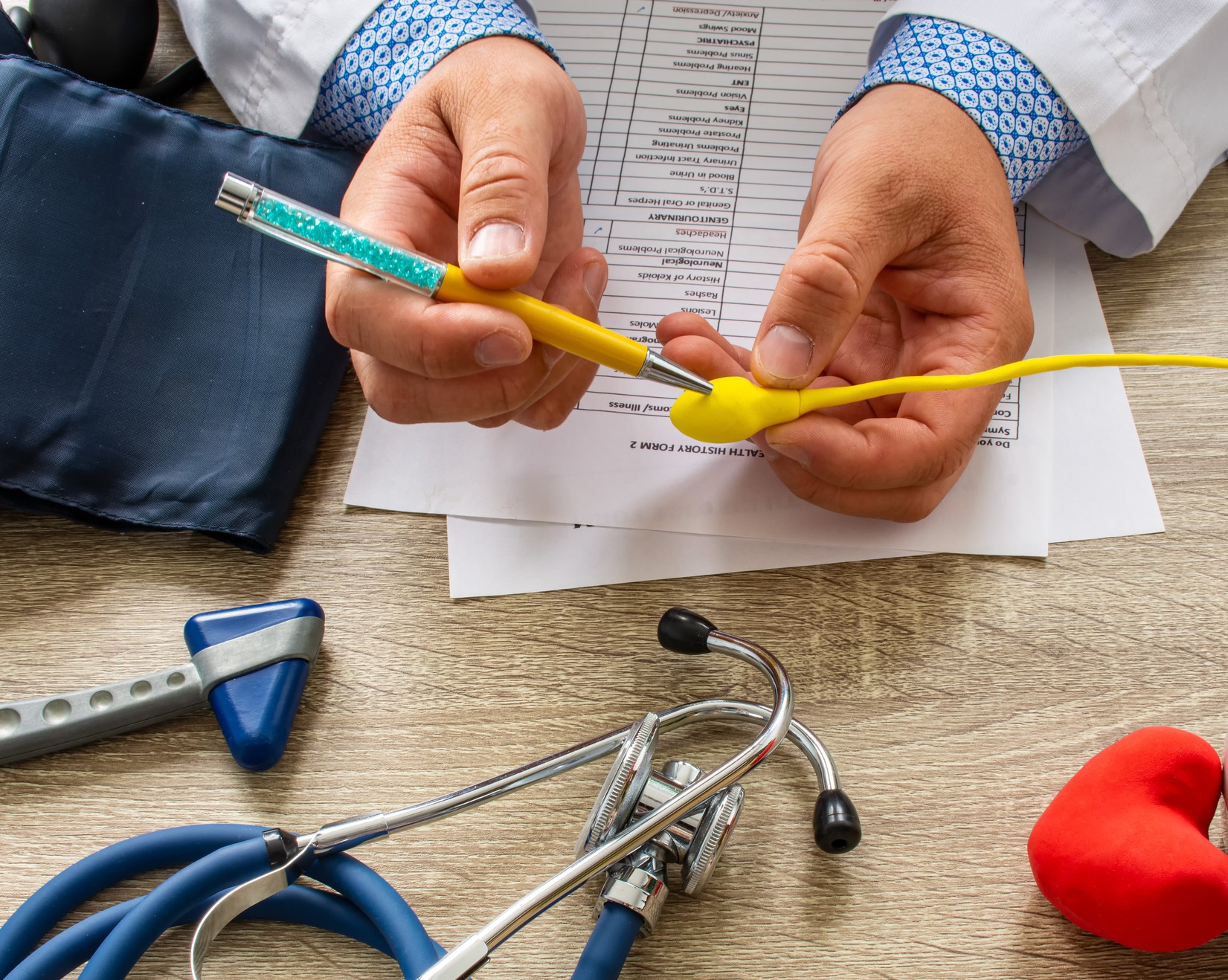-
Empowering Choices: The Vital Role of Pre-Vasectomy Reversal Counseling

If you are considering a vasectomy, it is important to understand the procedure and all the factors worth considering. Storing sperm before you undergo the procedure is a good idea, because nearly 20 percent of men change their minds after having a vasectomy, deciding that they do want to father a child (or another child) after all. Cryopreservation of sperm is available, and can facilitate sperm storage. Still, many men decide they want to undergo a vasectomy reversal, and this option is not only viable, but much more successful than it has been in years past. Here, we offer some information to help improve your understanding of vasectomy reversal options and the importance of pre-reversal counseling.
The Process of Vasectomy Reversal
Somewhere between two and six percent of American men will undergo a vasectomy reversal. Vasectomy reversal is done using microsurgery, and there are two different types of reversal used: vasovasostomy (VV) or vasoepididymostomy (VE). These procedures were first used in the early 20th century, but have improved by leaps and bounds since then, and have a much higher success rate now than they had even a few decades ago. So, why is counseling for vasectomy reversal so important?
Importance of Pre-Vasectomy Reversal Counseling
Vasectomy reversals are safe and effective, but they are not something that patients should enter into without careful consideration. Rather, the process should be thoroughly discussed with a qualified vasectomy reversal surgeon, to ensure that the patient understands the procedure. Pre-vasectomy reversal education should start with statistics regarding success rates, and should also involve explanations of the different surgical techniques that could be used. For a VV, the surgeon makes a small incision in each side of the scrotum, then removes scar tissue, flushes the vas deferens, and checks for sperm. If the fluid is clear, or sperm are present, the surgeon will then carefully connect the ends of the vas deferens, which was cut during the vasectomy. If the fluid is not clear, but is pasty and thick, the surgeon will switch gears and perform a VE procedure instead. This typically happens when the vasectomy happened over 10 years prior to the vasectomy reversal, or there is scar tissue blocking the epididymis. In a VE procedure, the vas deferens is connected to one of the tubules on the epididymis, located behind the testicles. This is a more complex procedure, because the epididymis is attached to the testes, so the testes will need to be removed from the scrotum before the epididymis and vas deferens can be connected. It is a technically demanding surgery, requiring the skills of an experienced microsurgeon.
Evaluation Before Vasectomy Reversal
In addition to counseling the patient on the types of procedures, the doctor will need to evaluate the patient’s baseline fertility, because if a man had difficulty with conception before the vasectomy, infertility is likely to remain a problem. If the patient has a history of hernia repairs or other pelvic surgeries, the doctor may need to perform an intraoperative vasogram. Patients should also be made aware of the option of intraoperative sperm extraction and cryopreservation, especially for couples who have lower fertility potential. If a man requires a bilateral EV, cryopreservation with intraoperative sperm extraction may be the right option.
Commonly Asked Questions Pre-Vasectomy Reversal
- What is the likelihood that the vasectomy reversal will be successful? The success rate for a VV procedure is fairly high. It drops somewhat if you have to have a VE procedure, or if your vasectomy is more than 10 years old. Still, the success rate is between 60 and 95 percent.
- Does a vasectomy ever result in nerve damage? Sometimes, pain from nerve damage can happen after a vasectomy, so it is important for a patient to have a full workup before a vasectomy reversal, to determine whether the pain can be resolved.
- How is vasectomy reversal surgery performed? Typically, vasectomy reversals are performed as outpatient surgery, under general anesthesia, though you and the anesthesiologist will determine the best option for your anesthesia together. The surgery will take between two and three hours, and when you wake up, you will probably not have too much discomfort, because you will have been given a long-lasting local anesthetic.
- How long does it take to recover from a vasectomy reversal? It can take anywhere from five to 14 days to feel like yourself again after this procedure. It is recommended that you avoid sexual intercourse and heavy lifting for the first four weeks after the surgery.
- Is there anyone who shouldn’t have a vasectomy reversal? Some patients are better candidates than others. If the patient’s partner has had a tubal ligation, though, it is probably better to try surgical sperm retrieval and IVF, rather than trying to have a vasectomy reversal and a tubal ligation reversal.
- Does a vasectomy reversal cause any side effects? Usually, side effects from a vasectomy reversal are minimal, and include swelling, pain, or bruising. Neither the vasectomy or the reversal should impact potency or urinary function.
- Does vasectomy reversal carry a cancer risk? While there was a report several years ago linking vasectomies with prostate cancer, but this report has been largely disproven. There is no evidence connecting vasectomy reversal to a higher cancer risk.
- Is there an age limit for a vasectomy reversal?
- How can one find the right surgeon for this procedure? Look for an experienced surgeon who performs reversals regularly and has special training in male fertility and men’s health.
Center for Vasectomy Reversal Cares About Men’s Health
At the Center for Vasectomy Reversal, men’s health is our priority. We pride ourselves on helping men improve their health and fertility through uncompromising, concierge-level patient care. Dr. Green and his team provide state-of-the-art treatment for men who need a reversal of their vasectomy or have other fertility concerns. Having had extensive training in urology, microsurgery, and vasectomy reversal, Dr. Green founded the Center for Vasectomy Reversal to provide the highest level of patient care while delivering optimal surgical results. To learn more about how our experienced team can help you reach your reproductive goals, contact us through our website or call 941-894-6428.
-
Does age impact vasectomy reversal success?

Man looking into vasectomy reversals.
Modern Vasectomy Reversals
Vasectomy reversal used to be a long shot, but in recent decades, technological advancements have made it a much more effective procedure. With the advent of microsurgical techniques, the success rate of this intricate procedure has risen significantly. In the 1970s and 80s, a vasectomy reversal could be expected to succeed, returning sperm to the semen, in about 79 to 88 percent of cases. By 2004, that success rate had climbed to between 94 and 97 percent. Many men worry, though, that their age will impact their chances of regaining fertility. Let’s take a look at the question of whether age impacts vasectomy reversal success.
Men’s Age and Overall Fertility
More and more, people are waiting to start a family. This can be a concern for women, whose fertility begins to decline in their 30s, but men’s fertility declines at a slower rate. Then, too, age-related health concerns can affect men, impeding both their fertility and their odds of successful vasectomy reversal. The good news? Age does not seem to have an impact on the procedure itself. As long as a man is healthy enough for a surgical procedure, his chances of a successful vasectomy reversal are good. In fact, recent research analyzing the results of 3,000 men over 50 and 350 men under 50 determined that the age of the man was not a significant factor in the success of the procedure. The researchers concluded that men over 50 should consider vasectomy reversal a viable option.
Which Factors Impact the Success of the Procedure?
While age is not an independent factor, certain elements can impact the chances of success. Smoking decreases the odds of successful vasectomy reversal, and men with older partners were less likely to conceive. Surgery in the groin area, including hernia surgery, can also decrease the likelihood of successful reversal. The most important factor, however, was the time elapsed since the vasectomy. Often, men have vasectomies when they’re young, and then change their minds and want to restore their fertility when they’re older. Studies done in years past have indicated that the longer a man waits after his initial surgery, the lower the chances of a successful reversal. However, newer research, using modern techniques, has shown that the success rates are about the same for reversals done within 15 years of the original vasectomy, regardless of the amount of time that has elapsed within those 15 years. After 15 years, however, the success rates dropped significantly, going as low as 44 percent.
Why is Time a Factor?
As time passes after a vasectomy, pressure can build between the vas deferens and the epididymis. When a vasectomy reversal is performed, this pressure can require the surgeon to perform a more complex, less reliable procedure. The most common type of vasectomy reversal is a vasovasostomy, which is straightforward, just reconnecting the previously severed vas deferens, and has a success rate of over 90 percent. When there is increased pressure or blockage, the surgeon may need to pivot to a more complicated technique known as a vasoepididymostomy, which involves locating and alleviating the blockage from the epididymis. An experienced surgeon can still accomplish a successful reversal, so speak to your doctor if you have concerns.
Center for Vasectomy Reversal Cares About Men’s Health
At the Center for Vasectomy Reversal, men’s health is our priority. We pride ourselves on helping men improve their health and fertility through uncompromising, concierge-level patient care. Dr. Green and his team provide state-of-the-art treatment for men who need a reversal of their vasectomy or have other fertility concerns. Having had extensive training in urology, microsurgery, and vasectomy reversal, Dr. Green founded the Center for Vasectomy Reversal to provide the highest level of patient care while delivering optimal surgical results. To learn more about how our experienced team can help you reach your reproductive goals, contact us through our website or call 941-894-6428.
-
The Personal Touch in Medicine: Why a Patient-Centric Vasectomy Reversal Matters

The Rise of Patient Centered Care
In generations past, doctors were not questioned very much. Today, patients have a wealth of information available to them at the click of a button. In fact, some patients arrive at appointments brandishing pages they’ve printed from the internet, challenging the information they’ve been given by the doctor. This is actually a good thing. Patients should be equal partners in their own healthcare, and a doctor who takes a condescending or paternalistic approach can undermine a patient’s confidence. This makes the patient less able to manage his or her own health, whereas a doctor who recognizes, supports, and helps strengthen a patient’s capabilities will help make that person more self-sufficient. Doctors who are willing to take the time to provide their patients with information, listen to their concerns, and personally follow up on their health management can make all the difference.
Dr. Joshua Green
At Center for Vasectomy Reversal, our team works under the direction of Dr. Joshua Green, and Dr. Green’s philosophy has always involved providing the very best patient care possible. He is a skilled surgeon, having finished in the top ten percent of his medical school class at Jefferson Medical College in Philadelphia before completing surgical and urologic training at the University of Miami School of Medicine and Jackson Memorial Hospital. In Miami, he participated in infertility research focused on the effects of spinal cord injury on male fertility and bladder function. He has presented research findings at the annual meetings of the American Urological Association and the American Society for Reproductive Medicine, and he is certified by the American Board of Urology and is a Fellow of the American College of Surgeons.
Focus on Education
It is obvious that Dr. Green prioritizes education, and not just for himself. When it comes to his patients, he and his staff do their best to make sure the patients are educated and informed, able to make intelligent decisions about their own care. Questions are welcomed, as are discussions, and patients are given as much information as possible about their procedures. During surgery, the operation is photographed, and each patient receives his photos at the end of the case. He also takes great pride in teaching, and severs as Clinical Assistant Professor, Department of Clinical Studies, Florida State College of Medicine.
Patient-Centered Care
A vasectomy reversal is one of the most intimate and intricate procedures a man can undergo. Understanding this, Dr. Green established the Center for Vasectomy Reversal with personalized care at the forefront of his philosophy. Personally concerned with each of his patients, he provides them with his cell phone number, making himself available to his patients seven days a week. In fact, the entire staff has this kind of availability, and they strive to always provide concierge level care to all of their patients and the patients’ families, treating them with confidentiality, professionalism, and compassion.
Center for Vasectomy Reversal Cares About Men’s Health
At the Center for Vasectomy Reversal, men’s health is our priority. We pride ourselves on helping men improve their health and fertility through uncompromising, concierge-level patient care. Dr. Green and his team provide state-of-the-art treatment for men who need a reversal of their vasectomy or have other fertility concerns. Having had extensive training in urology, microsurgery, and vasectomy reversal, Dr. Green founded the Center for Vasectomy Reversal to provide the highest level of patient care while delivering optimal surgical results. To learn more about how our experienced team can help you reach your reproductive goals, contact us through our website or call 941-894-6428.
-
Understanding the Vasectomy Reversal Procedure: How Does it Work?

Couple reading about vasectomy reversal procedure.
Vasectomy vs Reversal
A vasectomy is a type of permanent sterilization, performed on men who do not wish to father any more children. It’s an outpatient procedure that’s minimally invasive, and about 500,000 men in the United States undergo a vasectomy each year. Of that number, about six percent later change their minds and opt for a vasectomy reversal. How do the two procedures differ? And can a vasectomy be successfully reversed? The vasectomy reversal process is much more complicated than a vasectomy, but medical science has made great strides in vasectomy reversal over the past several decades, and the procedure has a success rate of up to 90 percent.
Having a Vasectomy
During a vasectomy, the surgeon cuts and blocks the tubes known as the vas deferens, which are responsible for carrying sperm from the testicles to the semen. After a successful vasectomy, a man’s semen no longer contains sperm, making pregnancy impossible. The procedure itself takes about 30 minutes, is relatively simple, and recovery is quick, with most men able to resume normal activity within a day or two. Sexual relations can even be resumed within just a few days of a vasectomy. Vasectomies are typically covered by insurance.
The Vasectomy Reversal Procedure
Unlike a vasectomy, a vasectomy reversal is not usually covered by insurance. And though the procedure is typically outpatient, it can take three or four hours to complete. It is a complicated microsurgery, in which the surgeon reattaches the severed ends of the tubes to each other. The first step is to identify the level of blockage in the tubes, after which fluid from the vas deferens is collected and analyzed under a microscope. Once this examination is complete, the surgeon decides on one of two vasectomy reversal procedures.
- Vasovasotomy (VV) involves stitching the cut ends of the vas deferens together. This is the most common and simplest type of reversal.
- Vasoepididymostomy (VE) reconnects the vas to a point on the epididymis past the blockage. Though this is less common, up to 40 percent of men require this more complicated procedure.
Efficacy of a Vasectomy Reversal
Vasectomy reversals are up to 90 to 95 percent effective. VV procedures typically have higher success rates than VE surgeries, but a vasoepididymostomy still has a success rate of 65 to 70 percent. The reason this procedure is so much more successful than in decades past is because o the advent of microsurgery, in which the procedure is performed with assistance of an operating microscope. A vasectomy reversal is more likely to be successful within 10 years of the original vasectomy procedure.
Center for Vasectomy Reversal Cares About Men’s Health
At the Center for Vasectomy Reversal, men’s health is our priority. We pride ourselves on helping men improve their health and fertility through uncompromising, concierge-level patient care. Under the direction of Dr. Joshua Green, our team provides state-of-the-art treatment for men who need a reversal of their vasectomy or have other fertility concerns. Dr. Green has had extensive training in urology, microsurgery, and vasectomy reversal, and he founded the Center for Vasectomy Reversal to provide the highest level of patient care while delivering optimal surgical results. To learn more about how our experienced team can help you reach your reproductive goals, contact us through our website or call 941-894-6428.
-

Couple doing vasectomy reversal research.
Are You Having Second Thoughts?
Sometimes, men have a vasectomy, thinking they don’t want any more children, but then have second thoughts. About 300,000 men in the United States have vasectomies each year, and somewhere between three and six percent of those men later decide to reverse those vasectomies. In the past, this was a long shot. Today, vasectomy reversal is safe and effective. But is it the right option for you? Here are some factors to consider when making the decision.
Conception is Not Guaranteed After a Reversal
Vasectomy reversals are much more successful than they used to be, but no procedure is 100 percent perfect. Sometimes, it takes up to 12 months for a stable semen analysis test, and sometimes other factors make conception difficult. Your partner’s age and fertility status come into play, as do things like testicular issues, the length of time since the vasectomy was done, and problems with the vasectomy itself.
There May Be Health Risks
Serious complications are rare with vasectomy reversal, but they do sometimes occur. Bleeding within the scrotum, infection at the surgery site, and chronic pain can all result, though they are uncommon.
Vasectomy Reversal Can Be Costly
Vasectomy reversal can be expensive, even without considering costs like anesthesia fees. What’s more, health insurance often will not cover it. Talk to your fertility specialist about the cost, and make sure there are no surprises when you receive your bill.
Finding the Right Surgeon is Important
Vasectomy reversal is a complicated procedure, involving complex microsurgery. Ultimately, the original surgery can have a major impact on the reversal. For a successful reversal, choose an experienced, trained microsurgeon. Ask about the success rates of any surgeon you are considering, and check credentials before committing.
Three Vasectomy Reversal-Friendly Situations
- Your life has changed significantly. Maybe you’ve become a widower, or you’ve divorced, and now you’re remarried. Maybe you have lost a child. Whatever the reason, if your life changes make you re-evaluate the decision not to have more children, a vasectomy reversal may be the right choice.
- You’ve had a sincere change of heart. You might have been 100 percent sure, earlier in life, that you didn’t want children or that your family was complete already. Now, later in life, you’ve come to regret that decision. Vasectomy reversals can be reversed many years after the original procedure, so if you have changed your mind, talk to a specialist about whether a vasectomy reversal is right for you.
- The vasectomy has caused issues for you. Sometimes, men experience complications following a vasectomy. This is not common, but if it does happen, your surgeon may recommend a vasectomy reversal to correct the problem.
Fertility Experts Offering Exceptional Patient Care
At the Center for Vasectomy Reversal, we pride ourselves on helping men improve their fertility through uncompromising, concierge-level patient care. Under the direction of Dr. Joshua Green, our team provides state-of-the-art treatment for men who need a reversal of their vasectomy or have other fertility concerns. To learn more, contact us through our website or call 941-894-6428.
-
What to Expect After a Vasectomy Reversal

After your vasectomy, you probably didn’t need much down time to recover. A vasectomy is a simple, outpatient procedure, and most men are able to go back to work about two days after they’ve had it done. But what about vasectomy reversal? While a vasectomy reversal is also an outpatient procedure, it’s much more complex. Does that make recovery more intense? Here’s what you can expect after a vasectomy reversal.
- After your surgery, expect some pain. In fact, you may have pain in your groin for one to three weeks. There may also be bruising and swelling, and you’ll need to wear tight-fitting underwear or compression shorts for about a week to support the area and prevent any stitches from coming out. Your stitches should dissolve in about seven to 10 days. Fortunately, the pain probably won’t be severe and should start to improve over the course of several days.
- Take it easy for that first week. For the first 24 hours, rest whenever you feel tired. Lie down as much as possible and remember that sleep is important for your recovery. After the first day, gradually increase your activity, walking a little bit daily and trying to go a little further each day. This is important for increasing your blood flow, and it can prevent constipation and pneumonia. Don’t do anything that could be hard on your groin, or anything that involves lifting heavy things. Don’t ride a bike, jog, do aerobic exercise, or lift weights until your doctor says it’s ok, usually anywhere from four to eight weeks after the procedure. Don’t lift anything as heavy as a milk jug, and certainly don’t lift a child. Let someone else do the driving, until your doctor gives you the go-ahead to drive again.
- Keep the area dry. You can shower, but your doctor may advise you to wear an athletic supporter when you do so. Don’t take a bath or do anything else that would get your testicles wet.
- Ask your doctor when you can resume your daily activities. If you have a desk job, you may be able to return to work as soon as one week after your surgery. However, if your job involves any kind of strenuous activity or heavy lifting, it could take a few more weeks before you’re ready to go back. Your doctor can advise you on this and will also give you instruction on when you can resume having sex. Typically, men are advised to wait at least four weeks.
- Your doctor will also give you instructions about medication and diet. IF you are prescribed pain medication, be careful to take it only as directed. If your doctor prescribed antibiotics, make sure to take the full course, and don’t stop just because you feel better. Ask for instructions about restarting any medication you had been taking before the procedure. Most of the time, you can return to your normal diet. However, if your medication is making you feel sick to your stomach, a bland diet may be best. Make sure you drink plenty of fluids to stay hydrated, unless your doctor advises you otherwise.
At the Center for Vasectomy Reversal, we are well-versed in providing effective vasectomy reversals. We pride ourselves on helping men improve their fertility through uncompromising, concierge-level patient care. Under the direction of Dr. Joshua Green, our team provides state-of-the-art treatment for men who need a reversal of their vasectomy or have other fertility concerns. To learn more, contact us through our website or call 941-894-6428.
-
Getting Pregnant After a Vasectomy Reversal

While vasectomies have long been considered a permanent form of birth control, today’s advances in microsurgical techniques have made it possible to successfully reverse a vasectomy. Typically, you will be able to conceive a child after vasectomy reversal: studies indicate that about 75 percent of men who have undergone vasectomy reversal can conceive naturally. However, the process can take time. Here are some factors that come into play when you are trying to get pregnant after having a vasectomy reversed.
- The type of vasectomy reversal impacts the length of time it takes to conceive. The simpler form of reversal is called a vasovasostomy, and men who have this kind of procedure should have sperm present in the ejaculate after about three months. The more complicated type of procedure, a vasoepididymostomy, is done when there is a blockage in the epididymis, close to the testicle. After this kind of procedure, it can take six to 12 months for the ejaculate to contain sperm.
- It takes some time for sperm count to build back up to the right levels for conception. Just because sperm is present in the ejaculate, it does not necessarily mean there is a normal sperm count. It takes time for sperm to normalize, and it can be several months before the sperm count is high enough for conception. Once it is, it can still take several months for a couple to conceive.
- The amount of time since the vasectomy affects the success of the reversal. Typically, the longer it has been, the more difficult it will be to conceive. The highest rates of success are usually seen within five years of the procedure, and after 10 years, pressure can cause a blockage that will mean the surgeon must perform a difficult procedure, known as a vas-to-epididymis reconstruction, which can reduce the success rate for conception.
- Both paternal and maternal age come into play when trying to conceive after a vasectomy reversal. In women over thirty-five years of age, hormone and ovulation cycles are more difficult to predict, and this increases the difficulty of conception. For men over fifty, sperm quality or concentration can decrease, increasing the amount of time needed to conceive. In some cases, an alternative method of conception, such as in vitro fertilization, may be recommended to help increase the chances of conception.
At the Center for Vasectomy Reversal, we are well-versed in providing effective vasectomy reversal. We pride ourselves on helping men improve their fertility through uncompromising, concierge-level patient care. Under the direction of Dr. Joshua Green, our team provides state-of-the-art treatment for men who need a reversal of their vasectomy or have other fertility concerns. To learn more, contact us through our website or call 941-894-6428.
-
What to Consider Before Having a Vasectomy Reversed

A vasectomy is a fairly straightforward procedure, an outpatient operation with few complications. A vasectomy reversal, on the other hand, is complicated. While today’s vasectomy reversals are much more effective than the reversals of the past, there’s a lot to consider before you decide if that’s the right option for you.
What makes this procedure complex? It involves microsurgery, in which the surgeon reconnects the vas deferens, the tubes that carry sperm from the testicle into the semen. This is a very delicate operation, which must be performed by a skilled surgeon, experienced in using a high-powered microscope to complete these surgeries. Here are some other things to think about before you decide on a vasectomy reversal.
- Know whether you’re a good candidate. The good news is that no matter how much time has passed since you had a vasectomy, you can still have a vasectomy reversal. A skilled surgeon with the right expertise can successfully reverse a vasectomy that was performed 15 or 20 years ago and, in some cases, even longer. If you’ve had other groin surgeries since, though, that could reduce your chances for a successful reversal. The among of tissue removed during your vasectomy also makes a difference in how the procedure is performed. If the vasectomy was straightforward and there’s enough tissue left for a successful reversal, the procedure that’s done is called a vasovasostomy. In this procedure, the surgeon sews together the severed ends of each tube. If a vasovasostomy can’t be done with a good chance of success, the doctor will opt for a vasoepididymostomy, in which the vas deferens is attached directly to the epididymis, the small organ at the back of the testicle that holds the sperm. In rare cases, a reversal is not possible, but that doesn’t mean there’s no possibility of reproductive success. Using another microscopic procedure, the surgeon can remove sperm from the epididymis for in vitro fertilization (IVF).
- Understand that there are some risks. In some cases, bleeding inside the scrotum can lead to a hematoma, a collection of blood that causes painful swelling. There’s also the risk of infection at the surgery site, but this is uncommon, as is persistent pain after the surgery. One thing that is not a risk of vasectomy reversal is sexual dysfunction. While this is a common concern, erectile function will not be damaged by this procedure.
- Keep your expectations realistic. While the success rates of vasectomy reversals are good, that doesn’t mean that a couple will conceive immediately. It can take time for sperm to return to ejaculate after the surgery, and while some couples achieve pregnancy within several weeks after the procedure, it can take up to one year for others.
- Choose a surgeon based on qualifications, not cost. Because of the nature of this surgery, it’s crucial that you find an experienced microsurgeon with good vasectomy reversal success rates. While you can sometimes find “low cost” vasectomies online, budget should not be your primary concern in such an important decision. Check your surgeon’s qualifications carefully before deciding on the person who will perform this intricate procedure.
If you decide a vasectomy reversal is right for you, depend on the experts at Center for Vasectomy Reversal. We pride ourselves on helping men improve their fertility through uncompromising, concierge-level patient care. Under the direction of Dr. Joshua Green, our team provides state-of-the-art treatment for men who need a reversal of their vasectomy or have other fertility concerns. To learn more, contact us through our website or call 941-894-6428.
-
Why You Should Choose Dr. Green to Perform Your Vasectomy Reversal

A vasectomy is a fairly simple outpatient procedure, completed in 10 to 30 minutes. A vasectomy reversal, on the other hand, is more complicated. Not all vasectomy reversals are the same, and it’s important to find a surgeon who knows how to choose the right surgery for you and is skilled in this kind of delicate microsurgical procedure. That’s why we encourage you to choose Dr. Joshua Green, an expert in microsurgery and male infertility.
Dr. Green is from Philadelphia, but he has lived in Florida for over 25 years. Since moving to Sarasota in 2000, he’s been in private practice, in partnership with five other urologists. Their practice performs not only vasectomies and vasectomy reversals, but also many other procedures, covering nearly all aspects of adult urology. Dr. Green has two offices for patient convenience, one in Sarasota and another near Lakewood Ranch. He has hospital privileges at Sarasota Memorial Hospital, Lakewood Ranch Medical Center, and Doctors’ Hospital of Sarasota.
If you’re looking for a surgeon with impeccable credentials, look no further. Dr. Green is a Board-Certified member of the American Urologic Association and Fellow of the American College of Surgeons, as well as maintaining membership in the American Society for Reproductive Medicine and the Society for Male Reproduction and Urology. He’s also served as Chairman of the Department of Surgery at Sarasota Memorial Hospital.
Having graduated with Honors from the prestigious Jefferson Medical College of Thomas Jefferson University in Philadelphia, Dr. Green completed further, rigorous training in General Surgery and Urology at the University of Miami, Jackson Memorial Hospital. After his urology training, he underwent further training in microsurgery and vasectomy reversal through the American Urologic Association in Houston.
Since completing his training, Dr. Green has performed hundreds of microscopic infertility procedures, with an impressive success rate. These surgeries require meticulous surgical techniques and high-powered operating microscopes. In a vasectomy reversal, the sutures used are also microscopic- about 1/3rd the diameter of human hair- and are used to create a multilayered reconnection of the vas deferens. Dr Green performs vasectomy reversals in an accredited surgery center in Sarasota, with a Board-Certified anesthesiologist involved in every case to ensure total comfort during the surgery.
His vast experience has allowed Dr. Green to finely tune his skills, but this is not the only thing that sets him apart in the field of infertility microsurgery. The level of patient care offered by the Center for Vasectomy Reversal is outstanding. Each patient receives Dr. Green’s personal cell phone number, and he and his staff are available to patients seven days a week.
-
How Vasectomy Reversal Procedures are Performed

Vasectomies are a common procedure for couples who have completed their families, in part because they’re a simpler procedure than a tubal ligation. Sometimes, however, men change their minds after they’ve had a vasectomy. It could be that the couple decides they want another child, or gets a divorce, but whatever the reason, it’s now possible for men to have their vasectomies successfully reversed. Vasectomy reversal, however, is a more complicated process.
The most common procedure to reverse a vasectomy is the vasovasostomy. This is a surgical reconnection of the vas deferens, the tube that carries sperm away from the testes. Generally, there’s a vas deferens on each side of the body, about the diameter of a strand of spaghetti, and these tubes are divided when a vasectomy is performed. Sperm production doesn’t stop after a vasectomy, but the sperm are no longer able to leave the body. A vasovasostomy allows ejaculation to occur again.
To perform a vasovasostomy, the surgeon makes a small incision in the scrotum. The vas deferens is isolated and dissected microscopically, divided above and below the obstruction caused by the vasectomy. The fluid from the testicle side is examined, and if it contains sperm, the surgeon reconnects the two ends of the vas deferens. This is done using multiple layers of micro suture and a powerful surgical microscope that magnifies the vas deferens to about 40 times its size. Once the vas is placed back into the normal position, a small drain is inserted in each side and the incision is closed with absorbable suture. The drains are removed the next day.
If there’s no sperm present in the fluid, the issue could be scar tissue that’s blocking the flow of sperm. If that’s the case, the surgeon may have to perform a more complicated procedure, called a vasoepididymostomy. There’s no way to know before surgery which procedure will be needed, so it’s important to find a surgeon capable of performing both. A vasoepididymostomy involves connecting the vas deferens to the epididymis. The longer it’s been since the vasectomy, the higher the possibility that a vasoepididymostomy will need to be performed.
The chances of a vasectomy reversal being successful are fairly high. If the vasectomy happened less than five years ago, there’s a greater than 95 percent chance that the ejaculate will contain sperm. Between five and ten years, it drops to about 90 percent, but even after ten years, the success rate is still between 80 and 90 percent. The chances of a successful pregnancy depend on several different factors, but with the help of a competent surgeon, many fertility issues can be overcome.
At the Center for Vasectomy Reversal, we pride ourselves on providing optimal surgical results and uncompromising, concierge-level patient care. Under the direction of Dr. Joshua Green, our team provides state-of-the-art treatment for men who need a reversal of their vasectomy or have other fertility concerns. To learn more, contact us through our website or call 941-894-6428 for a free consultation.
Recent Posts
Popular Posts
categories
- Uncategorized
- Sperm Retrieval
- vasectomy reversal
- Emergency
- Dr. Green
- sperm count
- fertility
- male infertility
- MESA
- medical care
- low sperm count
- IVF
- male fertility testing
- anesthesia
- pregnancy
- sperm aspiration
- semen analysis
- post-vasectomy pain syndrome
- infertility
- VE
- anti-sperm antibodies
- older dad
- general anesthesia
- gender reveal party
- post-operative infections
- baby name
- parent
- baby's first year
- fertilization process
- spinal anesthesia
- ACS Fellow
- nutrition tips
- concierge-level care
- fertility planning app
- azoospermia
- out-of-town patients
- V-V
- post-vasectomy reversal
- conceiving
- vasectomy
- vasoepididymostomy
- smoking
- sperm quality
- baby registry
- infographic
- surgical care
- surgical consultation process
- prostate cancer
- baby gender
- family time
- COVID
- Baby Shower
- Child Care
- Halloween Costume Ideas for Babies
- Halloween
- Halloween Safety Tips
- Celebrity Infertility Spotlight
- Postpartum
- testosterone
- Father's Day
- Father
- Men's Health
- Thanksgiving
- Pregnancy Announcement
- Parenting Tips
- Sperm
